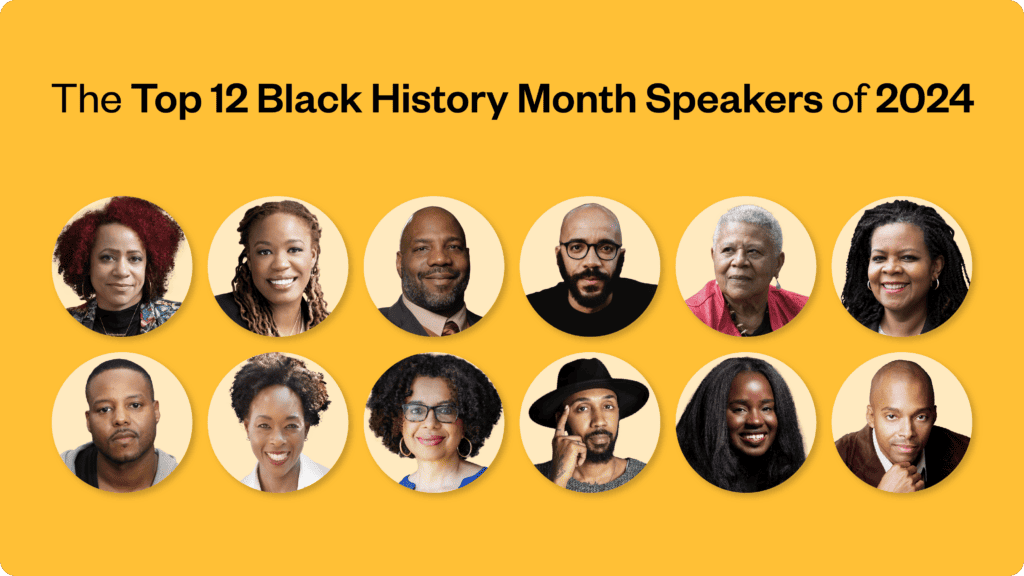NIKOLE HANNAH-JONES
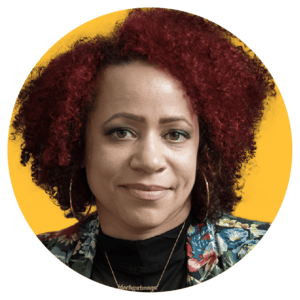
The Pulitzer Prize-winning creator of ‘The 1619 Project’—the #1 NYT bestseller which has now been adapted into a six-part docuseries on Hulu—says that Black history is American history. Nikole Hannah-Jones was named one of TIME’s 100 Most Influential People in the World for her work in uncovering the real origin story of Black Americans, and with it the true history of democracy.
HEATHER MCGHEE
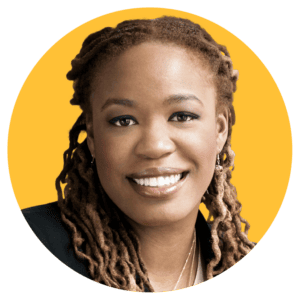 Racism doesn’t just harm people of color—it harms us all. Heather McGhee traveled across the country, speaking with ordinary people nationwide, to reveal how racism has an economic cost for everyone, and how, by fighting it, we can all prosper together. Drawing on her instant New York Times bestseller The Sum of Us—as well as the Young Readers edition and podcast of the same name—she offers vital stories of hope and solidarity across lines of division.
Racism doesn’t just harm people of color—it harms us all. Heather McGhee traveled across the country, speaking with ordinary people nationwide, to reveal how racism has an economic cost for everyone, and how, by fighting it, we can all prosper together. Drawing on her instant New York Times bestseller The Sum of Us—as well as the Young Readers edition and podcast of the same name—she offers vital stories of hope and solidarity across lines of division.
JELANI COBB
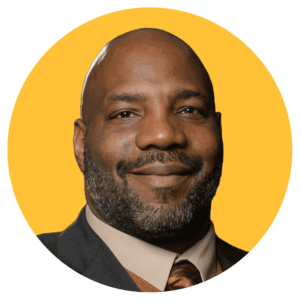
In the fight for racial justice, we must face the past to forge a better future, says Columbia Journalism School Dean and Peabody Award-winning journalist Jelani Cobb. As a long-time staff writer at the New Yorker and editor of the magazine’s anthology The Matter of Black Lives, Jelani explores the complexities of race and inequality, while offering guidance for the future.
CLINT SMITH
 Our understanding of Black American history has been incomplete for a long time, says Clint Smith. As the author of the #1 NYT bestseller How the Word Is Passed, which won the National Book Critics Circle Award for Nonfiction and was named to The NYT’s 10 Best Books of the Year, Clint offers a compelling exploration of the legacy of slavery. He travelled to nine sites across the country and beyond to show how the marks of our past continue to shape our cities, our policies, and the stories we tell—and how we can work towards a fuller, more equitable story for everyone.
Our understanding of Black American history has been incomplete for a long time, says Clint Smith. As the author of the #1 NYT bestseller How the Word Is Passed, which won the National Book Critics Circle Award for Nonfiction and was named to The NYT’s 10 Best Books of the Year, Clint offers a compelling exploration of the legacy of slavery. He travelled to nine sites across the country and beyond to show how the marks of our past continue to shape our cities, our policies, and the stories we tell—and how we can work towards a fuller, more equitable story for everyone.
MINNIJEAN BROWN-TRICKEY
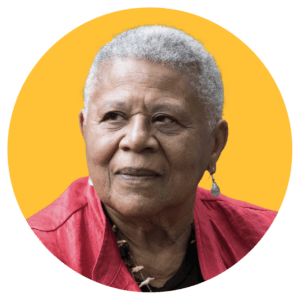 Making history as one of the Little Rock Nine, Minnijean Brown-Trickey faced down angry mobs and armed guards at only 15 years old to become one of the first Black teenagers to attend what had previously been a whites-only school. This fiery activist’s role in desegregating public schools, as well as her years of work as an award-winning teacher, writer, and community worker, has made her a civil rights legend.
Making history as one of the Little Rock Nine, Minnijean Brown-Trickey faced down angry mobs and armed guards at only 15 years old to become one of the first Black teenagers to attend what had previously been a whites-only school. This fiery activist’s role in desegregating public schools, as well as her years of work as an award-winning teacher, writer, and community worker, has made her a civil rights legend.
ANNETTE GORDON-REED
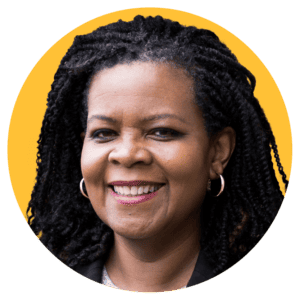 The first Black person to win a Pulitzer Prize for History, Annette Gordon-Reed played a crucial role in helping Juneteenth (a day that commemorates the end of slavery) gain national recognition. Drawing on her acclaimed book On Juneteenth, this MacArthur Genius shows us how the legacy of this holiday continues to influence us and our fight for racial justice today, and how we can keep striving for progress together.
The first Black person to win a Pulitzer Prize for History, Annette Gordon-Reed played a crucial role in helping Juneteenth (a day that commemorates the end of slavery) gain national recognition. Drawing on her acclaimed book On Juneteenth, this MacArthur Genius shows us how the legacy of this holiday continues to influence us and our fight for racial justice today, and how we can keep striving for progress together.
TITUS KAPHAR
 Art has the power to reframe our history. When you dislodge history from its status as the “past,” you unearth its contemporary relevance, says award-winning artist Titus Kaphar. This MacArthur Genius, whose powerful artwork on the Ferguson protests appeared on the cover of TIME, works with history and his own story—familial and personal—to offer a stirring portrait of the here and now and tell the stories that have long remained untold.
Art has the power to reframe our history. When you dislodge history from its status as the “past,” you unearth its contemporary relevance, says award-winning artist Titus Kaphar. This MacArthur Genius, whose powerful artwork on the Ferguson protests appeared on the cover of TIME, works with history and his own story—familial and personal—to offer a stirring portrait of the here and now and tell the stories that have long remained untold.
GEORGE M. JOHNSON

An award-winning non-binary author and activist named to the TIME100 Next, George M. Johnson is the author of the NYT bestseller All Boys Aren’t Blue, one of the most banned books in the country. A powerful story of growing up as a young Black queer boy, their memoir was called “an exuberant, unapologetic memoir infused with a deep but clear-eyed love for its subjects” (New York Times).
ANNA GIFTY OPOKU-AGYEMAN
 Co-founder of the only non-profit organization addressing the pipeline and pathway problem for Black women in fields of economics, finance, and policy, Anna Gifty Opoku-Agyeman aims to forge a path forward. Drawing on her book The Black Agenda, which features Black voices across diverse fields of policy, Anna offers practical and surprisingly simple ways to fight discrimination in the workplace and beyond, ensuring that everyone—especially Black women and our other marginalized communities—has what they need to thrive.
Co-founder of the only non-profit organization addressing the pipeline and pathway problem for Black women in fields of economics, finance, and policy, Anna Gifty Opoku-Agyeman aims to forge a path forward. Drawing on her book The Black Agenda, which features Black voices across diverse fields of policy, Anna offers practical and surprisingly simple ways to fight discrimination in the workplace and beyond, ensuring that everyone—especially Black women and our other marginalized communities—has what they need to thrive.
KHALIL GIBRAN MUHAMMAD
 Almost every company nationwide believes in the ideals of diversity, equity, and inclusion. So why are many organizations still struggling to hire and retain diverse talent? Harvard Kennedy School professor Khalil Gibran Muhammad, award-winning author of The Condemnation of Blackness, explores the history behind our failure to implement true DEI. And he explains the three barriers—efficiency, color-blindness, and investment—that we must overcome if we want the best ideas and talent for our companies today.
Almost every company nationwide believes in the ideals of diversity, equity, and inclusion. So why are many organizations still struggling to hire and retain diverse talent? Harvard Kennedy School professor Khalil Gibran Muhammad, award-winning author of The Condemnation of Blackness, explores the history behind our failure to implement true DEI. And he explains the three barriers—efficiency, color-blindness, and investment—that we must overcome if we want the best ideas and talent for our companies today.
RACHEL L. SWARNS
 “Slavery is more than just history,” says Rachel L. Swarns. “It lives with us, all of us, now.” As author of The 272—an acclaimed addition to our understanding of our national story that’s been widely discussed, from NPR’s Fresh Air to The New York Times—Rachel reveals the compelling story of the families that were enslaved and sold by Catholic priests to build Georgetown University and the Catholic Church itself. She offers audiences a fuller picture of slavery’s contemporary legacy—and gives us hope for one day transcending it.
“Slavery is more than just history,” says Rachel L. Swarns. “It lives with us, all of us, now.” As author of The 272—an acclaimed addition to our understanding of our national story that’s been widely discussed, from NPR’s Fresh Air to The New York Times—Rachel reveals the compelling story of the families that were enslaved and sold by Catholic priests to build Georgetown University and the Catholic Church itself. She offers audiences a fuller picture of slavery’s contemporary legacy—and gives us hope for one day transcending it.
MARGOT LEE SHETTERLY
 The story of NASA’s “human computers” was mostly untold—until Margot Lee Shetterly published her #1 NYT bestseller, Hidden Figures. Now a hit film, Hidden Figures illuminates the stories of the Black women mathematicians who were instrumental in getting humans to the moon. In sweeping, dramatic detail, Margot sheds light on a forgotten but key chapter in our history, inspires us to seek out diverse talent and stories, and instills in us a sense of wonder and possibility.
The story of NASA’s “human computers” was mostly untold—until Margot Lee Shetterly published her #1 NYT bestseller, Hidden Figures. Now a hit film, Hidden Figures illuminates the stories of the Black women mathematicians who were instrumental in getting humans to the moon. In sweeping, dramatic detail, Margot sheds light on a forgotten but key chapter in our history, inspires us to seek out diverse talent and stories, and instills in us a sense of wonder and possibility.
What is Black History Month?
Black History Month is a time dedicated to recognizing and celebrating the significant contributions and achievements of Black individuals throughout history. Every February, this month provides a focused period to reflect on the struggles, successes, and persistent spirit of Black communities. A BHM event is a chance to learn more about the rich cultural heritage, the relentless pursuit of civil rights, and the influences of Black people in America.
What makes this month significant?
Black history has shaped the social, political, and economic fabric of society. By spotlighting the stories and legacies that are often overlooked, Black History Month fosters a deeper understanding and appreciation of Black history as an integral part of the collective human experience.
Why book a Black History Month speaker?
Booking a Black History Month speaker is key for fostering education and awareness about the pivotal role of Black individuals in history. Black History Month speakers inspire audiences, bolster effective diversity and inclusion efforts, initiate important dialogues on racial justice, and strengthen community bonds. Our top BHM keynote speakers go into the many facets of Black history and life—uncovering realities that have remained hidden in the public.
BHM speakers offer a dynamic and personal approach to understanding and appreciating a vital part of our shared human story.
Watch a short highlight reel featuring these speakers and more:
